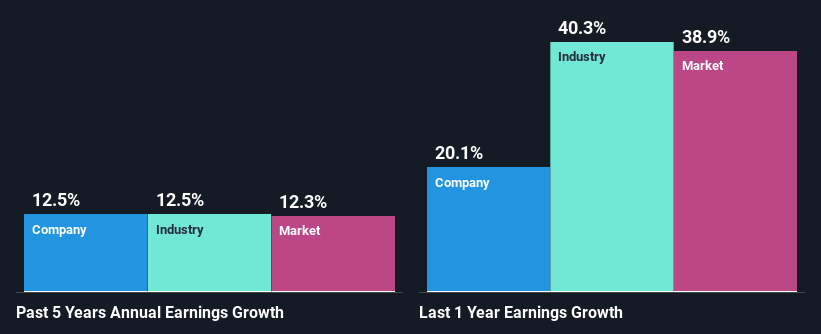Is Badger Meter, Inc.'s (NYSE:BMI) Latest Stock Performance A Reflection Of Its Financial Health?
Badger Meter (NYSE:BMI) has had a great run on the share market with its stock up by a significant 11% over the last three months. Given that the market rewards strong financials in the long-term, we wonder if that is the case in this instance. Particularly, we will be paying attention to Badger Meter's ROE today.
ROE or return on equity is a useful tool to assess how effectively a company can generate returns on the investment it received from its shareholders. Put another way, it reveals the company's success at turning shareholder investments into profits.
View our latest analysis for Badger Meter
How Is ROE Calculated?
The formula for ROE is:
Return on Equity = Net Profit (from continuing operations) ÷ Shareholders' Equity
So, based on the above formula, the ROE for Badger Meter is:
15% = US$56m ÷ US$382m (Based on the trailing twelve months to June 2021).
The 'return' refers to a company's earnings over the last year. So, this means that for every $1 of its shareholder's investments, the company generates a profit of $0.15.
What Has ROE Got To Do With Earnings Growth?
We have already established that ROE serves as an efficient profit-generating gauge for a company's future earnings. Depending on how much of these profits the company reinvests or "retains", and how effectively it does so, we are then able to assess a company’s earnings growth potential. Generally speaking, other things being equal, firms with a high return on equity and profit retention, have a higher growth rate than firms that don’t share these attributes.
Badger Meter's Earnings Growth And 15% ROE
To start with, Badger Meter's ROE looks acceptable. And on comparing with the industry, we found that the the average industry ROE is similar at 14%. Consequently, this likely laid the ground for the decent growth of 13% seen over the past five years by Badger Meter.
As a next step, we compared Badger Meter's net income growth with the industry and found that the company has a similar growth figure when compared with the industry average growth rate of 13% in the same period.
Earnings growth is a huge factor in stock valuation. What investors need to determine next is if the expected earnings growth, or the lack of it, is already built into the share price. This then helps them determine if the stock is placed for a bright or bleak future. Is Badger Meter fairly valued compared to other companies? These 3 valuation measures might help you decide.
Is Badger Meter Efficiently Re-investing Its Profits?
Badger Meter has a healthy combination of a moderate three-year median payout ratio of 41% (or a retention ratio of 59%) and a respectable amount of growth in earnings as we saw above, meaning that the company has been making efficient use of its profits.
Additionally, Badger Meter has paid dividends over a period of at least ten years which means that the company is pretty serious about sharing its profits with shareholders. Upon studying the latest analysts' consensus data, we found that the company's future payout ratio is expected to drop to 31% over the next three years. However, the company's ROE is not expected to change by much despite the lower expected payout ratio.
Summary
In total, we are pretty happy with Badger Meter's performance. Particularly, we like that the company is reinvesting heavily into its business, and at a high rate of return. Unsurprisingly, this has led to an impressive earnings growth. On studying current analyst estimates, we found that analysts expect the company to continue its recent growth streak. To know more about the latest analysts predictions for the company, check out this visualization of analyst forecasts for the company.
This article by Simply Wall St is general in nature. We provide commentary based on historical data and analyst forecasts only using an unbiased methodology and our articles are not intended to be financial advice. It does not constitute a recommendation to buy or sell any stock, and does not take account of your objectives, or your financial situation. We aim to bring you long-term focused analysis driven by fundamental data. Note that our analysis may not factor in the latest price-sensitive company announcements or qualitative material. Simply Wall St has no position in any stocks mentioned.
Have feedback on this article? Concerned about the content? Get in touch with us directly. Alternatively, email editorial-team (at) simplywallst.com.

 Yahoo Movies
Yahoo Movies 

